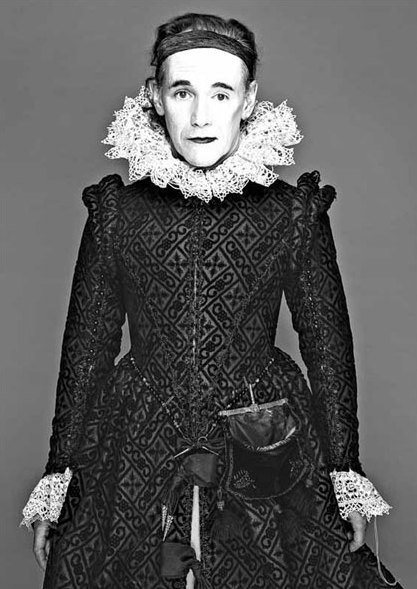 |
|
Mark Rylance as Olivia. At Shakespeare's Globe theater in London, he tried to recreate the more informal style that held sway in Shakespeare's time. [Photo/Agencies] |
A great Shakespearean performance is easy to spot: the language no longer feels remote, the humanity of the actor and the character seem indivisible, the emotion being expressed is no longer veiled by poetic phrasing but revealed by it.
A sterling example is Mark Rylance's Olivia in the current Broadway production of "Twelfth Night." The surface trappings of Mr. Rylance's performance might seem to heighten the sense of falsity that can often distract us when we are watching Shakespeare.
Mr. Rylance is, after all, clearly a man playing a female role - a convention drawn from the Elizabethan era, but one that in our day almost inevitably draws attention to itself. His face is plastered in white makeup and served on the platter of a stiff ruff around his neck. A pouf of hair like a charcoal brioche is coiled atop his head. The movement, too, is stylized: Gliding across the stage, Mr. Rylance seems to have roller skates under his black gown.
Yet when Mr. Rylance's Olivia opens her mouth to speak, the melancholy in her voice and the air of distracted grief are so palpable that the theatricality quietly evaporates.
Mr. Rylance's presence on Broadway this season, in "Twelfth Night" and "Richard III" running in repertory, provides a miniature master class in Shakespearean acting. And, of course, it also provides an opportunity to reflect on why some actors excel where others fall short.
Tim Carroll, the director of both "Twelfth Night" and "Richard III," has directed Mr. Rylance in 10 Shakespeare productions. What does Mr. Carroll consider to be Mr. Rylance's particular gift? An "animal cunning" that gives him the ability to "smell the room" and shape his performance accordingly; the "verbal intelligence to understand in a very personal way every word he's speaking"; and a practical savvy that allows him "to respond to problems with incredible speed," a necessary attribute in negotiating the complex machinery working inside a Shakespeare play.
Mr. Rylance's tutelage in Shakespeare dates back to his teenage years in Milwaukee. When he moved to London in 1978 to study at the Royal Academy of Dramatic Arts, he was surprised, he said, "to find that the actors I was working with didn't care for Olivier or Gielgud. They were admiring the truthfulness of Montgomery Clift, Marlon Brando of course, Robert Mitchum and other film actors."
When, at 35, Mr. Rylance became the first artistic director of Shakespeare's Globe theater in London, he felt that actors had for too long taken a secondary role in the shaping of Shakespeare productions, ceding the power to directors. The stage director, after all, was not a profession in the Elizabethan age.
He said his first order of business at the Globe was developing "a more equal relationship between actors and directors." 
Mr. Rylance and his collaborators also sought to recreate the more informal style that held sway in Shakespeare's time, when the relationship between actors and audience was less distant.
"I'm always searching for more spontaneity, and the sound of spontaneity in speaking," he said.
The waning of what Mr. Rylance refers to as the "English style" of Shakespearean acting - formal, rhetorical, presentational - has helped to erode the long-ingrained sense that, when it comes to Shakespeare, it helps if you're British. If you visit London with any regularity, you can easily fall under the sway of this thinking. Yet, in recent years, there has been equally superb Shakespeare in New York, notably John Douglas Thompson's Othello.
Mr. Thompson first came upon Shakespeare in a book of monologues. A life-changing visit to a production of August Wilson's "Joe Turner's Come and Gone" had inspired him to leave behind a business career. He'd never seen a Shakespeare play, but reading Mark Antony's eulogy for Caesar stirred him.
"There were words I had to look up," he recalled, "but I immediately understood it, and I wept."
Harriet Walter, the veteran British actress who just concluded a run as Brutus in Phyllida Lloyd's all-female "Julius Caesar" at St. Ann's Warehouse in Brooklyn, noted that Shakespeare plays require of actors a variety of skills - and a kind of physical stamina - that other roles do not.
She compares it to playing a musical instrument: "You have to have an ability to hear rhythm and to know how to place an emphasis in a string of words, so the meaning comes through," Ms. Walter said.
We return to Shakespeare's plays - and cherish actors who can bring them to life before us - because no writer has surpassed his gift for observing, and recording, how we live, how we love, why we laugh and cry, how we suffer and die.
